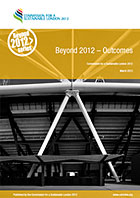
The Commission has published a review detailing what London 2012 organisers are doing to ensure sustainability standards are met during the Games-time period, and setting out recommendations where further work is needed.
The review, titled In Sight of the Finishing Line, focuses on how London 2012 is preparing to deliver the time-critical sustainability challenges facing organisers during the Games, and recommends areas for immediate improvement or action.
Overall, the Commission finds that good progress has been made towards meeting many sustainability commitments. London 2012 has committed to be the ‘most sustainable Games to date’ and has put robust plans in place to achieve this. There has been effective use of innovation in almost every area. LOCOG and ODA Transport achieving certification to BS 8901 – the British Standard specification for a sustainability management system for events – and the GLA City Operations team working towards certification is the first time any Olympic and Paralympic Games has achieved a standard like this. It is also a first for any major international event. There is evidence that London is on track to achieving this significant goal, such as the impressive work towards its zero waste commitment, and the delivery of the food vision.
However, some major challenges remain to be fully addressed. Having failed to deliver 20% of the electricity for the Games from renewable resources, LOCOG undertook in early 2011 to deliver equivalent savings through energy conservation. Although there is evidence of some initiatives, LOCOG does not have an overall energy conservation strategy. The Commission has recommended that this is addressed urgently.
All suppliers and commercial partners to the Games are expected to comply with LOCOG’s Sustainable Sourcing Code; but the Commission has not been able to verify LOCOG’s assurance processes to ensure this is happening for the use of HFCs in cooling and refrigeration. The Commission is concerned that as LOCOG cannot provide assurance for this area, they may be equivalent issues in other areas such as for timber and PVC.
Another issue arises from areas where multiple organisations are involved; leading to scenarios where the responsibility for sustainability management is not sufficiently clear.
Without clear coordination there is a risk that standards will vary considerably inside and outside venues, or even at different exits from the Olympic Park. For example, the Park’s exits lead into different boroughs, with different recycling bin policies, or exit into Westfield, which has its own recycling bin policy.
The Commission has attended the majority of the test events and was pleased with the overall site performance; providing feedback to the organisers where issues remain to be addressed.
http://www.cslondon.org/wp-content/uploads/downloads/2012/02/In_sight_of_the_finishing_line.pdf
The key findings of the review are:
1. LOCOG has been certified to BS 8901 [the specification for a sustainability management system for events] and the GLA City Operations team is working toward certification. This is a significant achievement and is the first time a Games has achieved such a standard.
2. We have seen good progress toward the challenging commitment to zero Games-time waste going to landfill, with at least 70% to be reused, recycled or composted.
3. LOCOG’s plans to deliver the food vision are developing well, with the main caterers on board and going out to the market for suppliers that can meet the requirements.
4. The Commission was not able to fully verify sound assurance processes within LOCOG for the use of HFC in cooling and refrigeration, to ensure that their Sustainable Sourcing Code will be complied with.
5. This has given the Commission concerns around the application of LOCOG’s assurance processes for other aspects of the Sustainable Sourcing Code such as timber and PVC.
6. There are challenges where there needs to be multiple organisations involved in meeting commitments and where there is not a traditional contractor–client relationship.
7. The GLA has appointed Live Nation as their Live Site operator and is pressing them to meet a range of London 2012 sustainability targets. The Commission recommends that they monitor and report on what they will meet, press them to meet commitments and set out the rationale for any areas where they will not.
8. We accepted that it was not practicable for LOCOG to meet its target to have 20% renewable electricity at Games-time and that they would meet at least the equivalent carbon reduction through a reduction in energy use. Whilst LOCOG has several initiatives to reduce energy use, they do not have a clear energy conservation plan setting out how they will achieve this commitment.
9. The Commission has attended almost all test events so far and found a good level of performance on site with key issues being identified and managed or learnt from.
10. The test events have raised some concerns that we have fed back to LOCOG. Key issues were the relative capacity of some contractors to manage sustainability issues and the challenges in getting good waste segregation.
